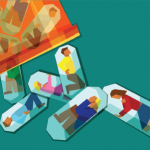The group of eight studies also included one that evaluated the role of aromatherapy and reflexology on RA-associated fatigue. Although both therapies appeared promising, reflexology had the largest effect on fatigue. However, the study was limited by the lack of blinding, the absence of long-term follow-up and no active control arm.
Lara C. Pullen, PhD, is a medical writer based in the Chicago area.
ad goes here:advert-1
ADVERTISEMENT
SCROLL TO CONTINUE
References
- Cramp F, Hewlett S, Almeida C, et al. Non-pharmacological interventions for fatigue in rheumatoid arthritis. Cochrane Database Syst Rev. 2013 Aug 23;(8):CD008322.
- Cramp F. The role of non-pharmacological interventions in the management of rheumatoid-arthritis-related fatigue. Rheumatology (Oxford). 2019 Nov 1;58(supple 5):v22–v28.

